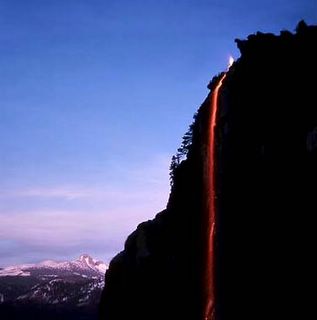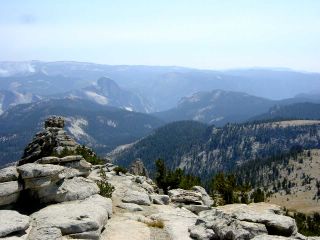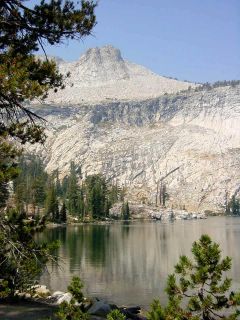A little bit of everything and a lot of nothing: images and stories to take us on an eclectic journey. . . . . . CLICK ON THE HEADING FOR THE "SOURCE" OF THE ARTICLE AND CLICK ON THE LINK BELOW FOR PHOTOGRAPHER. CLICK ON IMAGES FOR A LARGER VERSION.
Thursday, June 23, 2005
GIANT POPSICLE TURNS INTO A DISASTER
An attempt to raise a record-setting ice pop in New York as part of a promotion ended with a scene straight out of a disaster film--but much stickier. The 25-foot tall, 17 1/2-ton treat of frozen Snapple juice melted faster than expected, flooding Union Square in downtown Manhattan with kiwi-strawberry-flavored fluid. Firefighters closed off several streets and used hoses to wash away the sugary goo.
Sunday, June 12, 2005
THAT WAS THEN AND THIS IS NOW
Some differences between present day baseball rules and 1886 rules:
Now: Pitcher may pitch to a batter however he pleases.
Then: Batter, through the umpire, calls for high or low pitches, or both.
Now: Four balls is a walk.
Then: Seven balls is a walk.
Now: Hit batter is awarded first base.
Then: A pitch that hits the batter is counted only as one ball.
Now: Foul tip caught by catcher is an out only on the third strike.
Then: Caught foul tip is an out any time.
Now: Foul ball is an out if caught on the fly.
Then: Foul ball is an out if caught on the fly or on the first bounce.
Now: Pitcher pitches from rubber on mound.
Then: Pitcher pitches from a flat 4 by 6-foot hurler's box.
Now: Pitcher must wait until batter is ready before pitching.
Then: Pitcher may pitch any time he is in his hurler's box.
Now: Pitcher must have ball if he puts foot on the rubber.
Then: Pitcher may be in his box without ball (thus the "hiddenball trick").
Now: Pitcher may pitch to a batter however he pleases.
Then: Batter, through the umpire, calls for high or low pitches, or both.
Now: Four balls is a walk.
Then: Seven balls is a walk.
Now: Hit batter is awarded first base.
Then: A pitch that hits the batter is counted only as one ball.
Now: Foul tip caught by catcher is an out only on the third strike.
Then: Caught foul tip is an out any time.
Now: Foul ball is an out if caught on the fly.
Then: Foul ball is an out if caught on the fly or on the first bounce.
Now: Pitcher pitches from rubber on mound.
Then: Pitcher pitches from a flat 4 by 6-foot hurler's box.
Now: Pitcher must wait until batter is ready before pitching.
Then: Pitcher may pitch any time he is in his hurler's box.
Now: Pitcher must have ball if he puts foot on the rubber.
Then: Pitcher may be in his box without ball (thus the "hiddenball trick").
Friday, June 10, 2005
MT. EVEREST PROVIDES A HIGHPOINT IN THE ULTIMATE SEARCH FOR EXCITEMENT

Flying a two-cockpit aircraft, Royal Air Force Pilot David McIntyre and the Scottish marquess of Clydesdale became the first to fly over the summit of 29,035-foot Mt. Everest, the highest point in the world. This happened in 1933 and world climbers did not reach that point until 1953. And now a French helicopter has landed on the summit of Mt. Everest and then took off, twice. Helicopters are far more limited than airplanes at high altitudes because they depend on the bite of the rotors for their lift, a difficult feat in such thin air. The Eurocopter Ecureuil AS350 B3 used in the record-setting landing is described on a website promoting sightseeing flights in the Himalayas as "the sports car of the rotor world." The landing feat may be celebrated as a technical achievement. It also signals another likely diminishment of the ultimate wild spot of the world.

Saturday, June 04, 2005
TOILETS CAN BE A BLAST
A West Virginia man who says he was severely burned when a portable toilet exploded after he sat down and lighted a cigarette is suing a contractor and a coal company, accusing them of negligence. The cigarette ignited methane gas leaking from a pipe underneath the toilet unit. Perhaps the man would have preferred using the facilities shown below:
These facilities have a mirror-like exterior
Here's the view from the inside . . .
Friday, June 03, 2005
THE FIREFALL: THERE'S NEVER BEEN ANYTHING LIKE IT . . .

Yosemite's Firefall: At 9 p.m. each evening in Camp Curry, the crowd which had gathered for the nightly campfire program, would fall silent and the call would go out to Glacier Point, high above: "Let the fire fall", and a faint reply could be heard from the top of the mountain, about a mile above. Then a great bonfire of Red Fir bark would be pushed evenly over the edge of the cliff, appearing to the onlooker below as a glowing waterfall of sparks and fire. This spectacle was the Yosemite Firefall, a nightly tradition in Yosemite National Park for some 88 years. The early history of the Firefall dates back to the late nineteenth century, and has been credited to an Irishman by the name of James McCauley. Glacier Point's Mountain House had been completed in 1873 and its guests were able to enjoy its stunning views of Half Dome and the High Sierras beyond. How McCauley wound up pushing that first campfire over the edge of the cliff is not clear, but those who witnessed the spectacle from the valley floor were delighted and amazed, and James McCauley had a hit on his hands. For many years each night at 9 p.m. the resounding command could be heard: "Let the fire fall." During the 1960's I worked in the park and the Firefall was a nightly event. The "after-firefall" traffic exiting the park was like the freeway at rush-hour. Attracting such large crowds is probably the main factor responsible for doing this extravaganza in. In 1968 the Park Service Director decided that the Firefall tradition should come to an end. He reasoned that since it was just a man-made attraction, and one which caused a great congestion in the park, as well as damage to the meadows from the trampling by onlookers, that it should be ended. A pale scar remains to this day, where the fire burned away the cliff's lichen. Someday that scar will heal, and after that, all those who remember the Firefall will also pass, and this colorful oddly magical tradition will remain only in the pages of history.





